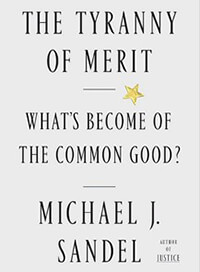Review by Myra Salzer
 The last time I talked to my good friend, Jay Hughes, he mentioned a couple of books that I might be interested in; The Tyranny of Merit by Michael J. Sandel was one. Over the years, Jay has recommended other books, all of which I’ve devoured eagerly. None of them would I have picked up on my own, but they gave me a new perspective and way of thinking. This book was no exception.
The last time I talked to my good friend, Jay Hughes, he mentioned a couple of books that I might be interested in; The Tyranny of Merit by Michael J. Sandel was one. Over the years, Jay has recommended other books, all of which I’ve devoured eagerly. None of them would I have picked up on my own, but they gave me a new perspective and way of thinking. This book was no exception.
According to conventional wisdom and my own belief system, I believed in a meritocracy. I thought merit should be a measure of success and failure and that all Americans have the right to succeed and to fail. This book had me looking at things differently. In fact, meritocracies have the opposite effect both on those who win and those who fail. It is remarkable that a single book could profoundly alter a long-standing belief, but it did.
This book was most definitely written by an academic. There were more references, statistics, and quotes than any book I’ve read in the last 10 years. Throughout the book, college admissions processes were used as an example of how a merit-based system fails to result in a just society. How refreshing that the author, a long-time professor at Harvard, viewed merit-based acceptances negatively. He saw the negativity of having to live one’s life with the sole purpose to get into an Ivy League school and how detrimental it is for [helicopter] parents to frame their lives around their children’s success. Furthermore, Sandel showed how “winning” admissions did not result in happy, well-adjusted students. The depression rates and suicide rates among students are inversely proportional to the school’s acceptance rates.
The flip side of meritocracy, for the numerous applicants rejected from the Ivy League or the college of their choice (the “losers”), is also detrimental to the psyche. These teens and young adults will forever carry with them the stigma of inadequacy. They may have tried every bit as hard and just not made the cut for myriad reasons having nothing to do with their qualifications.
While Sandel did tend to drone on and on and on about the negative consequences of meritocracy, he did propose one possible solution in the realm of college admissions which I thought was quite genius: rather than having an admissions process based on where a potential applicant falls within the realm of qualifications – such as SAT scores, extracurricular activities, and grade point average – he suggested that all qualified applicants be part of a random lottery. If the college’s acceptance rate is one in 30 applicants, wouldn’t it be better if those accepted into the program were randomly drawn? That way, the degree of merit would not falsely diminish or overly bloat the personification of the applicant.
Sandel broaches wider-ranging topics such as how the disparity of wealth falsely asserts the disparity of self-esteem and the disparity of how we as a society view work. He concludes that what is important is for everybody to feel they are making a contribution and that their contribution is valued. Why have we as a society deviated from that ideology?
While Sandel dedicated much of the book to supporting negative consequences of meritocracies, I concluded my reading with a feeling of hope for the future.